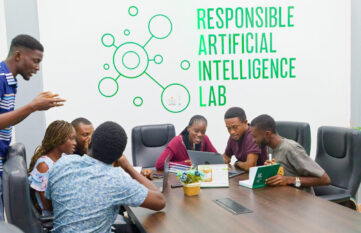At the beginning of September, you became Director-General of department 1 at the BMZ and now you are responsible for a wide range of topics: from global health to education and employment to food security. Which role does the digital transformation play for all these topics?
First of all: I am looking forward to this variety of topics and the new challenge! The role of digitalisation can already be seen in the new structure of the department: We have combined two decisive levers for a successful digital transformation with digitalisation and data. Digitalisation helps us to deal better with global challenges: Pandemics can be tracked and contained through digital epidemic management systems. Digital identities and electronic money transfers enable states to provide their populations with basic services, even without banks and accounts – and also to react quickly in emergencies. Artificial intelligence can help in the fight against climate change to recognise impending droughts or extreme weather early enough and to prepare for them. In addition, digital technologies offer citizens new job opportunities and possibilities to participate in political processes.
At the same time, we have to face the risks of digitalisation: From CO2 emissions to the digital gender gap, disinformation, surveillance, data abuse or internet restriction. Dealing with these rapid technological and social changes plays an important role in the work with our partners worldwide – also in international policy-making.
The German Government adopted a new digital strategy in August 2022 as a “signpost for digital awakening”, which also includes the development of an international digital strategy. How can the BMZ contribute to shaping the process?
Germany is the world’s second leading donor country in development cooperation, and the BMZ sees itself as a pioneer for a new understanding of digital development cooperation. One part of this role is to incorporate our experience and priorities into the dialogue about the international digital strategy. With the global GovStack initiative, we are also implementing a lighthouse project from the German government’s national digital strategy. However, our main concern is not a digital transformation per se. We want to ensure that an international digital transformation is human-centred, sustainable and inclusive – also in terms of international processes. From co-designing the Global Digital Compact to the EU Digital Agenda to the Internet Governance Forum of the United Nations: As a ministry, we advocate for a social-ecological and feminist digital policy and represent it in the circle of the G7, G20 and in multilateral networks such as the Digital Public Goods Alliance and the Smart Africa Alliance. The international heart of German digital policy lies in the BMZ.
What does such a digital transformation mean for the administrative modernisation at the BMZ?
For the modernisation of our administration, digitalisation, data management and IT go hand in hand. We are coordinating the digital transformation of the BMZ across departments, and we are also further expanding data expertise and the data base at the BMZ. The goal is to improve data-based policymaking in a transparent and efficient way. In future, we will consider the opportunities and risks of the digital transformation even more strongly from the outset of our projects. By doing so, we want to ensure that digitalisation is used as a standard in the BMZ to achieve our goals even more effectively and efficiently. In our data lab, we are breaking new ground by testing AI.
Prior to your job change, you were head of the department “Principles, Data and Effectiveness”. What fascinates you about data?
Data is multifaceted. It is an asset, a resource and also a right – depending on how you look at it. In any case, they are crucial for competitiveness, economic growth and innovation. At the same time, it carries risks. These include the misuse of data, the fragmentation of data markets and the lack of access to data – especially for countries in the Global South and for women or other disadvantaged groups. Recent years have impressively shown that control over data flows is equivalent to the power of influencing knowledge, politics, economics, elections, education, privacy and health. Building on the Federal Government’s Data Strategy, we are committed to ensure that data is used responsibly for the common good and to promote social progress. To achieve this, we want to promote a culture of data sharing in accordance with the strategy, in particular by making data available and empowering people to use data for their own purposes. The power to create value from data should not be in the hands of a few, but all social groups – including those in the Global South – should be able to use more data.
Which topic do you think will be future-oriented for digitalisation in development cooperation?
Digitalisation is changing the world at a rapid pace. If we want to actively shape the transformation, we have to act with foresight and consider the ethical aspects of the digital transformation. The further developments in artificial intelligence, with all its potential and dangers, will point the way forward for all of us, including development cooperation. AI is based on data that is programmed, trained and used by humans. Ethical responsibility therefore lies in human hands. Nevertheless, there is concern that these technologies will develop a life of their own. We can already see how a digital gender gap and persistent biases in data sets are reinforcing the underrepresentation of women and disadvantaged groups – especially in the Global South. Therefore, we need to ensure that gender-based or even colonial stereotypes are not perpetuated and that all people benefit from the opportunities of digitalisation. Furthermore, we should ensure that working conditions are improved by AI and new technologies and that people are not exploited, for example to train an AI.



